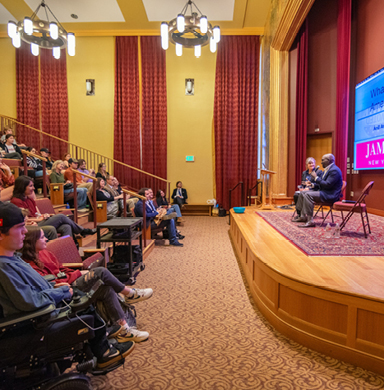What's the Matter with American Democracy?
Estlow Lecture Series with Jamelle Bouie
New York Times Columnist Jamelle Bouie visited the University of Denver campus on October 25, 2023 to lead a masterclass on the state of journalism and democracy in the United States. The annual event was held by the DU Center for American Politics and Estlow Center for Journalism and New Media with the help of MFJS faculty members, Dr. Lynn Schofield Clark and Dr. Seth Masket.
Based out of Charlottesville, Virginia, and Washington D.C., Bouie has previously worked for The Daily Beast, Slate, CBS News, and more. He has authored multiple publications and is a co-host of the popular podcast The Unclear and Present Danger.
In 2019, Bouie was named one of the most defining commentators on politics and race during the Trump administration by the Columbia Journalism Review. He was also named to the 30 under 30 media list for his coverage on Ferguson, Missouri in 2015.
Bouie and special guest, Santiago Mayer, covered a range of topics during a panel session hosted by Clark. The conversation ranged from civic ritual, his inspiration for recent publications, political history, polarization and more.
“I like to remind people that these things have always been the case,” said Bouie. “It has always been true that this is what American politics is like, and I don’t think it’s useful to say one period is worse than the other. There have been entire periods of U.S. history where the problems being faced have seemed especially intractable, and especially insufferable.”
As self-proclaimed history nerd, Bouie repeatedly delighted the audience with relevant historical context, humor and his out-of-the box approach to tackling issues of polarization in the present day political media climate.
Discussing the period of American history between 1814 and 1850, Bouie posited the case of abolitionist efforts, noting that even in the most impossible circumstances enacting change has always been possible for those with the courage to try. Citing the inspirational story of Salmon P. Chase, an abolitionist lawyer, Bouie infused hope and insight into his discussion.
“For Chase, looking at the landscape of American politics, not only does he have no expectation that slavery was ever going to end… but it was growing rapidly,” said Bouie. “Of course, by the time Chase hits his sixties slavery was gone. I bring this up because there is something to learn from the orientation towards politics of the abolitionists… the answer they come to is you’ve just got to do the work, because there are always smaller battles that can be won.”
Clark then prompted Bouie to speak on how his current work aims to shine a light on anti-democratic practices and initiate small steps towards change.
“I think I see myself as trying to remind readers that the political structure of the U.S. is not set in stone… It’s not particularly malleable but it can change,” said Bouie. “What I am trying to do is remind readers and listeners that things came to be this way in particularly contingent moments.”
Continuing his trend of correlating past and present, Bouie spoke on the lessons that he has learned from studying the founding fathers, arguing that political systems can always be changed and should be as the needs of society evolve over time.
“I find the founding fathers fascinating because at the end of the day they were just people, just dudes that were confronted with a set of political crises and proceeded through quite a bit of struggle to create a political solution,” said Bouie.
Finishing up with a Q&A session, Bouie interacted with the audience alongside Mayer before moving on to an event for faculty, alumni and special guests.
To learn more about upcoming events hosted by the Center for American Politics and Estlow Center for Journalism and New Media, visit the links included here.



